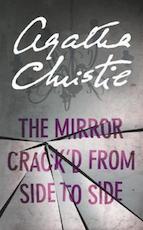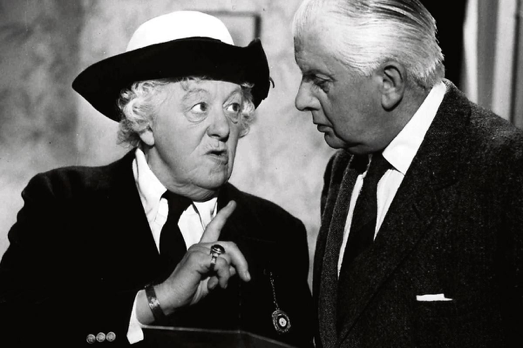
Poirot Score: 77
The Mirror Crack’d from Side to Side
☆☆☆☆
Reasons for the Poirot Score
A cracking whodunnit, decently clued and brilliantly misdirected with a great deal of humour and sharp observation on a changing Britain. Miss Marple is back in good form. Had this been written much earlier I would have given it an even higher score but I have marked it down a little because Christie has used several of the key plot devices before. And the modern reader may lack some of the knowledge needed to fully solve the puzzle. All in all, a great read.
Click here for full review (spoilers ahead)
Trivia
Dedication
To Margaret Rutherford in admiration
Margaret Rutherford (1892 – 1972) was a much loved English actor. She played Miss Marple in the four MGM films from the 1960s. Christie, for good reasons, was not fond of these films. They play up the humour rather than the mystery or malevolence. To enjoy them I have to put aside any thoughts of Agatha Christie’s novels and allow myself to be taken along by the humour and by the acting, in particular by Margaret Rutherford’s energy and comic timing. The first of the films was based on 4.50 from Paddington (see the Review of that novel on this website) and called Murder, She Said. It is the best of the four. Her real-life husband, Stringer Davis – they first met in 1945 when they appeared together at the Oxford Playhouse – has a smallish part in all these films.
Rutherford made her acting name on the London stage and in particular after performing Miss Prism in John Gielgud’s 1939 production of The Importance of Being Earnest, and in playing Madame Arcati, a role written with her in mind, in the 1941 production of Noël Coward’s Blithe Spirit. Both these performances can still be enjoyed by watching the 1945 film of Blithe Spirit directed by David Lean, and the outstanding Anthony Asquith film of The Importance of Being Earnest from 1952 which stars Edith Evans as Lady Bracknell with her famous shocked contemptuous disdain on learning that John Worthing, as a baby, was found in ‘a handbag’. I also enjoy Rutherford’s performance in the 1949 Ealing comedy, Passport to Pimlico. The truth of Kenneth Tynan’s remark is evident: that Margaret Rutherford ‘can act with her chin alone’. Margaret Rutherford was knighted (made a Dame) in 1967.

in the fourth and last of the MGM Miss Marple films, Murder Ahoy
Dish-washers
One had to face the fact: St Mary Mead was not the place it had been. … St Mary Mead, the old world core of it, was still there. … There were new people in most of the … old houses, but the houses themselves were little changed in appearances since the people who had bought them … liked the … ‘old world charm’. They just added another bathroom, and spent a good deal of money on plumbing, electric cookers, and dish-washers.
Chapter 1
Christie was a shrewd observer. Almost all her novels are set at the time they were written. All contain observations en passant about the world around her, the social mores and contemporary technology. From time to time she pauses the narrative to reflect on the accumulative changes that many of us fail to notice. Halfway through her 1950 Miss Marple novel A Murder is Announced she reflects on how English village life has changed since before the Second World War. ‘Fifteen years ago one knew who everybody was …If somebody new came to live there, they brought letters of introduction, or they’d been in the same regiment or served in the same ship as someone there already.’ Christie begins The Mirror Crack’d from Side to Side, which has many similarities to A Murder is Announced, with reflections again on changes to the English village, and the rise of housing estates, although Miss Marple is wise enough to understand that some of the changes are within herself. ‘One had to face the fact,’ Miss Marple muses, ‘St Mary Mead was not the place it had been. .. You could blame the war (both the wars) or the younger generation, or women going out to work, or the atom bomb, or just the Government – but what one really meant was the simple fact that one was growing old.’
Although the ‘dish-washer’ (now generally one word ‘dishwasher’) has a long history, beginning in the mid-nineteenth century, it was not until the 1950s that the designs, costs and plumbing made it a generally feasible labour-saving device in a domestic setting in North America and Europe. By the early 1960s, as Christie observes, dishwashers were beginning to be seen in wealthy British houses. Even then they were rare. Neither my parents, nor my wife’s parents, who were professional middle-class, had dishwashers installed until the 1970s. By contrast my parents, and grandparents, had top-loading automatic washing machines from shortly after the Second World War, and front-loading machines before the end of the 1950s. According to one source, in the UK the proportion of households owning a dishwasher has increased from 18% in 1994 to 49% in 2018. [statista.com] The equivalent figures for washing machines are 84% in 1994 and 89% in 2018.
The Vietnamese Buddhist monk and author, Thich Nhat Hanh, in his book The Miracle of Mindfulness (1975) did not see any point in a dishwasher: ‘I can see a machine for washing clothes, although I wash my own things out by hand, but a dishwashing machine is going just a little too far!’. Alan Davidson, diplomat and food writer, wrote, with his tongue just touching his cheek, of the almost liturgical aspects of washing up: ‘A better way of regarding it [washing up] is as the climax of the whole cycle (gathering, preparation, cooking, eating) and of a piece of ritual which should have engaged the attention of anthroplogists and the like to a much greater extent than the questions which have tended to preoccupy them…The purification of the utensils has to be the final, culminating stage of any meal.’ Davidson has this to say about the dishwasher: ‘the person or persons chosen [to do the washing up] should be viewed as having a privilege. Whether they use traditional techniques or harness modern machinery to help them is immaterial …’ [entry on ‘washing up’ in The Oxford Companion to Food edited by Alan Davidson].

